Wikipedia is one of the world’s most trusted sources of information. It is a free, online encyclopedia that several volunteers around the globe edit. However, in some countries, the platform is restricted or even completely blocked.
Governments and institutions often censor Wikipedia pages for political or cultural reasons, limiting users’ right to free knowledge and freedom of speech. Even in regions with open access, your ISP (Internet Service Provider) or bad actors are consistently on the watch (waiting to breach into your web traffic).
That’s where a VPN comes in. A reliable VPN encrypts your connection and masks your IP address, allowing you to browse Wikipedia freely and privately from anywhere in the world. Whether you’re a student, journalist, or curious reader, using a VPN ensures you can access uncensored information safely and securely.
But the question is, out of so many VPN services, which one can you trust? After testing dozens, we have come up with a list of the top VPN services to access Wikipedia.
Best VPN services to browse Wikipedia – Quick list
- NordVPN: A highly secure and lightning-fast VPN with the latest technology to easily access Wikipedia and other blocked websites.
- Surfshark: It is a low-cost and highly capable solution to unblocking Wikipedia. Offers unlimited connections and is very popular among students.
- ExpressVPN: Another top-quality VPN with solid performance, and high-end reliability for accessing Wikipedia from anywhere.
- Proton VPN: An excellent privacy-focused VPN that takes user freedom seriously and provides a useful free plan for basic use.
- Total VPN: A low-cost, simple VPN solution that comes with an excellent antivirus to provide complete ID protection.
Why use a VPN with Wikipedia?

Wikipedia is a worldwide platform, but not so much for everyone. Many countries censor or limit access to Wikipedia for a number of reasons including political, social, or religious overtones. A VPN is the simplest way to break down these barriers (or “digital walls,” as they say).
It helps you in many ways. Below are some of the top reasons why you might need a VPN to browse Wikipedia:
Defending your right to information
Due to government restrictions and censorship, more and more students and journalists are experiencing difficulty accessing useful information. Imagine being a student and finding it difficult to conduct your academic research via Wikipedia. What do you do as a journalist who is asked by the government to remove an article for political reasons?
In an age of disinformation with fewer checks and balances on violence, access to verified, neutral, and reliable information has never been more important. A VPN can help protect your right to access information without the interference of government/ corporate sources. For students and journalists, that is especially important.
Safeguarding your browsing experience from public Wi-Fi
A VPN is your savior when you are just connecting to the internet via your phone or laptop, and using public Wi-Fi in a cafe, airport, or hotel. Public Wi-Fi networks are considered dangerous, and hackers and snoopers always lurk on these networks to get into your device and steal your personal information.
That’s why it’s always recommended to use a VPN service while using public WiFi. A VPN encrypts your traffic and essentially creates a secure tunnel to protect your data.
5 top-notch VPNs to unblock Wikipedia – Detailed list
1. NordVPN

A leading VPN service provider that provides a seamless access to almost all geo-restricted websites, including Wikipedia.
Pros
- No compromise on speed
- Offers a stable connection across all locations
- An effective Threat Protection
Cons
- Some features require technical configuration
NordVPN is a high-quality VPN service that uses advanced technology to provide superfast connections with excellent security. It has usefull features (such as its Cybersec and DNS leak protection) for accessing Wikipedia in more censorship-heavy areas. For the combination of speed and security, NordVPN is an excellent choice.
The VPN is a rewarding choice with its new NordWhisper Protocol which can circumvent networks that restrict VPN traffic by disguising your encrypted data with normal-looking web traffic. This is paramount for bypassing the advanced systems of censorship (from governments and organizations) that prevent access to Wikipedia.
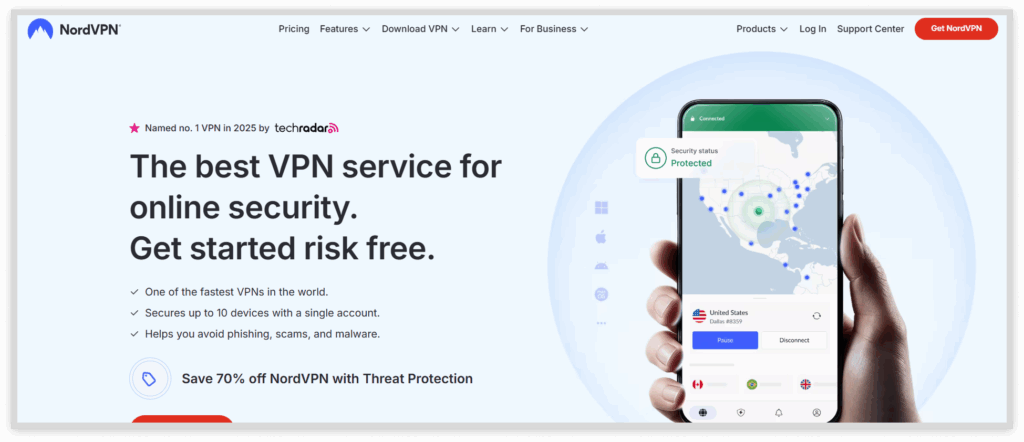
With more than 8000 servers in over 120+ countries, you’ll hardly have a problem finding a fast, uncensored server. That means you can have reliable access to Wikipedia anywhere in the world. It also has a Threat Protection, which helps secure your connection to Wikipedia with added protection against malicious/illegal sites and ads, helping with your research on Wikipedia.
2. Surfshark

An on-budget user favorite VPN that offers premium security and privacy features at a very low cost.
Pros
- Special offers for students
- Minimum lags
- A reliable customer support
Cons
- Some features are a bit complicated for beginners
Surfshark is an excellent service for budget-conscious users who want maximum VPN features. With its unlimited simultaneous connections under one subscription, it is a great choice for families and students, or if you are a busy researcher using multiple devices for work regularly.
It has a NoBorders mode that automatically activates and gives you a list of servers that the VPN has optimized to bypass censors. This is great for easily unblocking a specific website, like Wikipedia, from a restricted area.
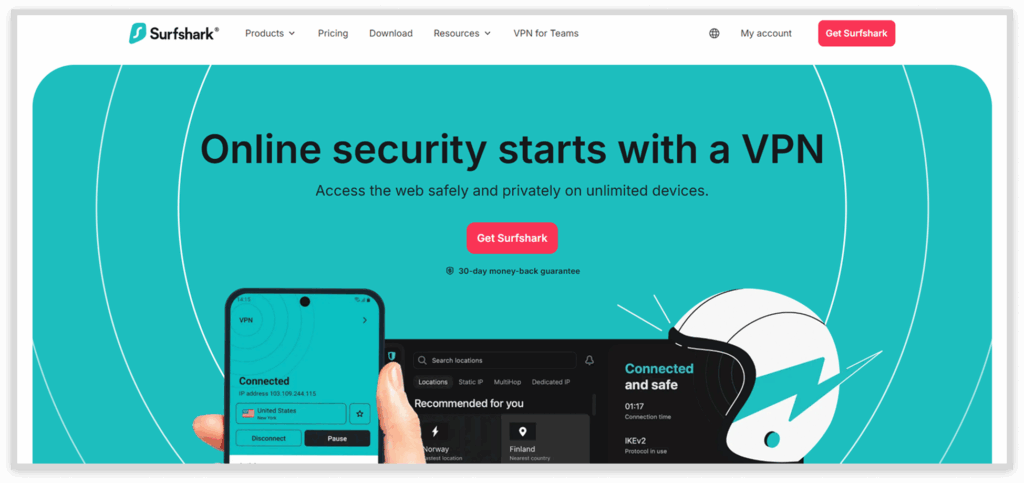
If you’re working on sensitive information and need double anonymity, you can also take advantage of the Multi-hop feature, which routes your internet traffic through two different VPN servers. This means that your connection and traffic are hidden behind another server, giving an additional layer of privacy to your connection and making it tougher for anyone to trace your connection back to you.
3. ExpressVPN

A favorite service of many that provides ultra-fast speed and stealth security features for accessing Wikipedia without much effort.
Pros
- Reliable performance and responsiveness
- Stealth protection against DDoS attacks
- Perfect speeds for gaming and streaming
Cons
- Mobile app lacks some advanced features
ExpressVPN is often regarded as the premium choice with easy-to-use apps and reliable connections. The VPN has its own Lightway protocol (in-house) that is advantageous for anyone who needs a fast and reliable connection for continuous browsing or editing Wikipedia pages.
The apps are really easy to use and work out of the box without configuration, which means that ExpressVPN is one of the top options for anyone using major any operating system and looking for something that works without much fuss.
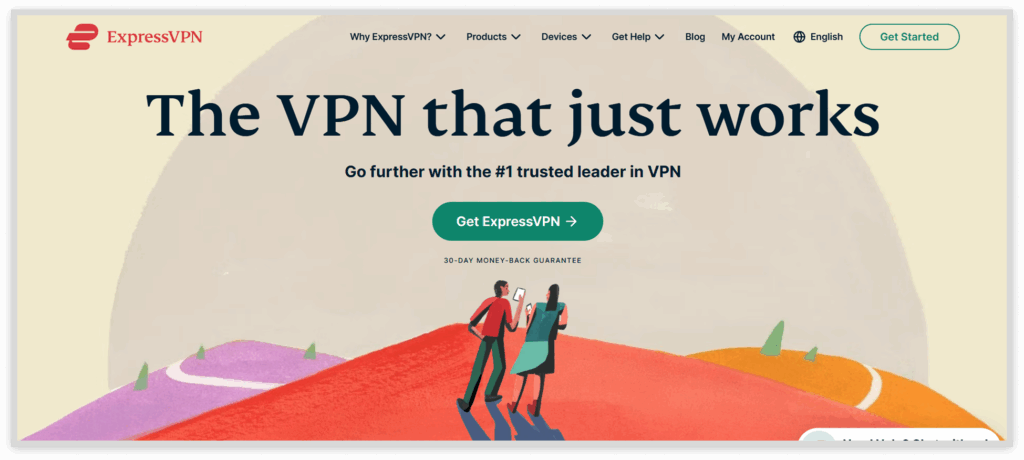
ExpressVPN has a large network that spans over 105 countries, allowing you to unblock Wikipedia and any other website seamlessly from anywhere with ease. From installing it to connect to a server, all you need are a couple of minutes to start browsing Wikipedia.
4. Proton VPN

A widely-used freemium VPN service that offers super-fast speeds across all its locations and provides optimum security.
Pros
- Based in a privacy-friendly region (Swizz Privacy Jurisdiction)
- Audited and tested no-log policy
- Free tier allows gaming
Cons
- Some servers have higher ping
Proton VPN is a reliable choice for anyone who prioritizes safety and digital freedom. Its sophisticated anti-censorship characteristics are tailored for users in severely restricted countries that want to navigate around government firewalls to access platforms like Wikipedia.
Proton VPN’s Stealth protocol is built to bypass internet censorship by disguising your VPN connection as standard web traffic. Its Alternative Routing reroutes your connection through third-party networks, so you can connect even if your government blocks access to its servers directly.
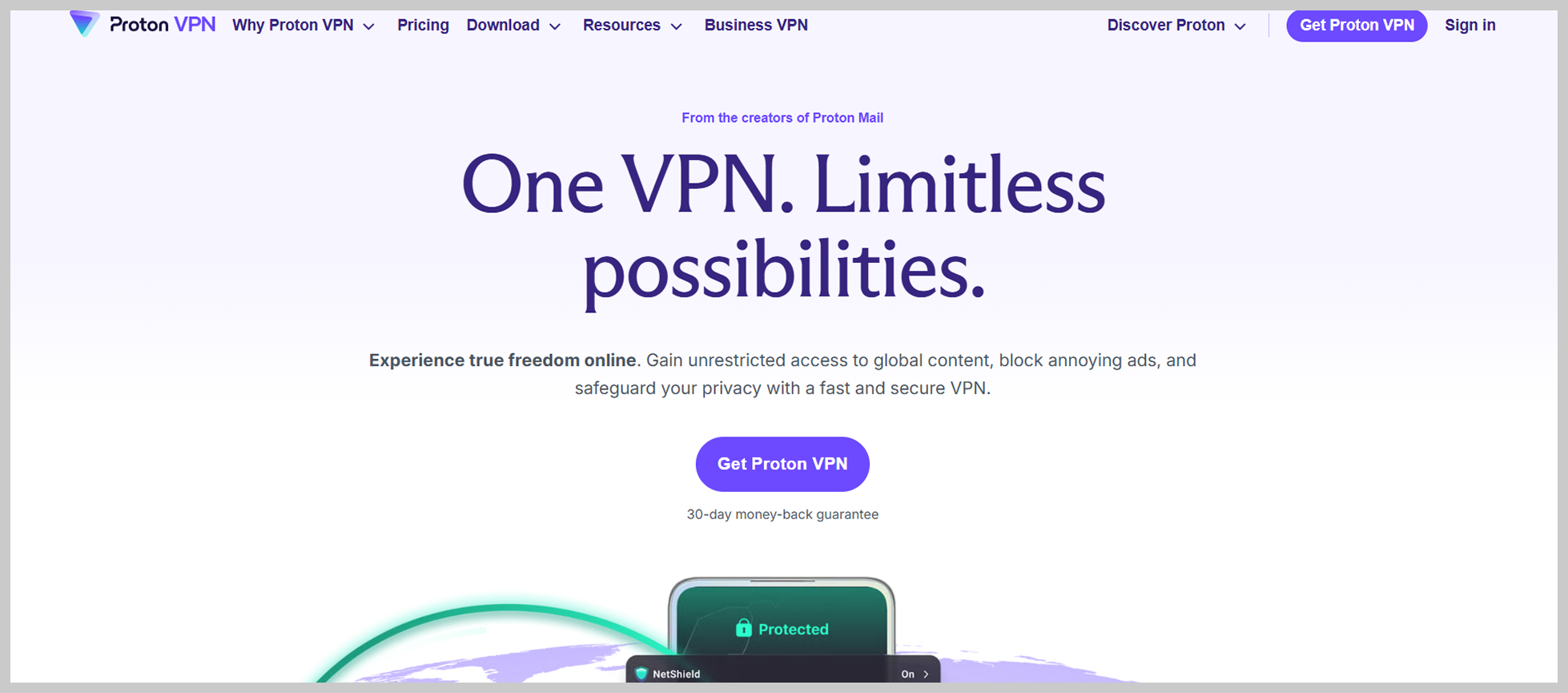
Plus, the VPN offers a totally free plan with no data caps. Although the free plan limits the number of server locations, this, nevertheless, is a convenient way of trying out a legitimate VPN and to unblock Wikipedia for free.
5. Total VPN

A decently feature-rich VPN service that offers basic security and privacy features and smooth access to geo-blocked content.
Pros
- Affordable pricing plans
- Responsive customer care
- Multi-device support
Cons
- Less popular than others
Total VPN is a practical and cost-effective solution, especially for those who are also want an antivirus in a single bundle. It is very user friendly (straightforward to use), making it a great choice for basic users who just need to unblock Wikipedia without fussing through advanced settings.
It may not have the advanced features to compete with industry giants such as NordVPN and ExpressVPN, but it does come with the Hydra protocol that is well known to download through firewalls and unblock content in other restricted areas.
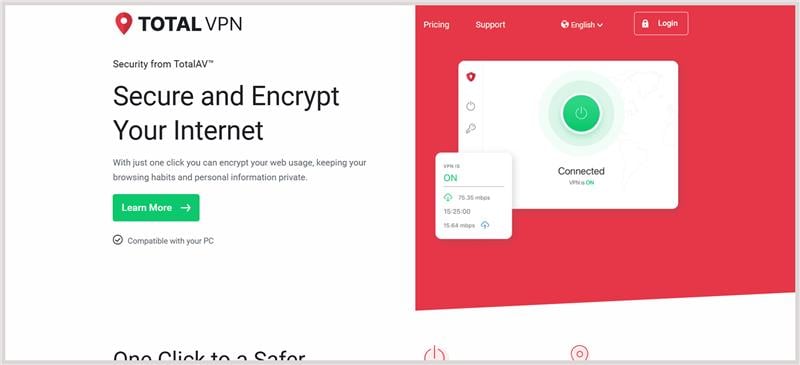
Also, the VPN service is part of the TotalAV suite, offering a convenience-based system of digital security. You get both a VPN and an antivirus software for a very reasonable price. With its kill switch and effective AES 256-bit encryption, it protects your browsing activity and access to Wikipedia remains secure.
Best VPNs for Wikipedia: Comparison table
| Feature | NordVPN | Surfshark | ExpressVPN | Proton VPN | Total VPN |
|---|---|---|---|---|---|
| No. of servers | 8,000+ | 3,200+ | 3,000+ | 1,2000+ | 50+ |
| No. of countries | 120+ | 100+ | 107 | 120+ | 50+ |
| Simultaneous connections | 10 | Unlimited | 8 | 10 | 5 |
| Money-back guarantee | 30 days | 30 days | 30 days | 30 days | 30 days |
| Dedicated IP | Yes | Yes | Yes | Yes | No |
| Kill switch | Yes | Yes | Yes | Yes | Yes |
| Audited No-Logs | Yes | Yes | Yes | Yes | No |
| VPN starting price | $3.09/mo | $1.99/mo | $3.49/mo | $3.59/mo | $1.99/mo |
How we selected these VPN services for Wikipedia
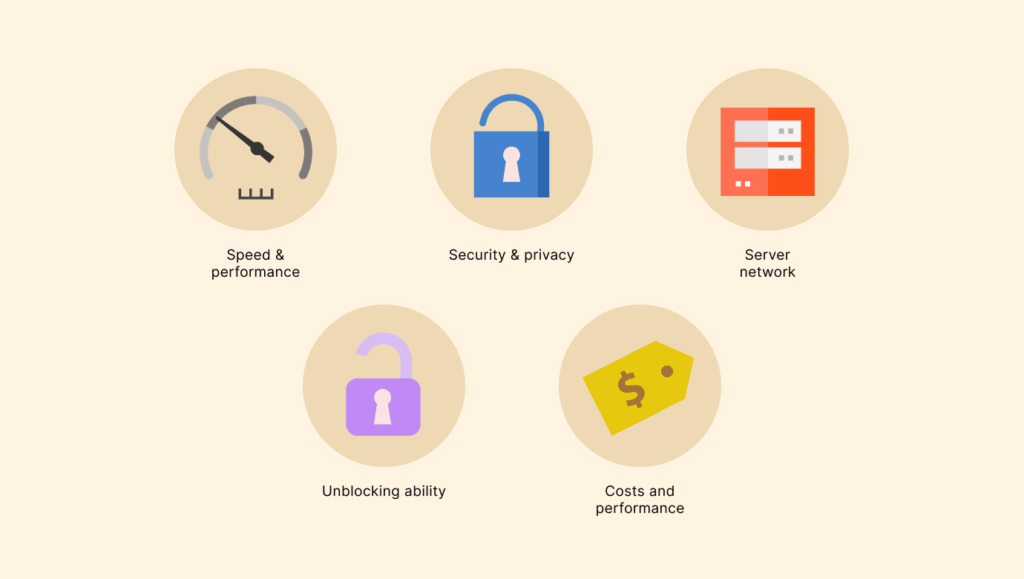
The goal of our framework for testing and validating each provider was to provide the best possible recommendation using a set of criteria. In explicit terms, it is to validate each VPN against the respective user’s best use case in accessing Wikipedia explicitly.
- Security and privacy: The main points of distinction is dealing with security and privacy. We selected VPNs that offered sufficient features with regard to security, covering the basic features, such as AES-256 encryption, kill switches, and/or DNS leak protection. In addition, a VPN should have a strict audited no-logs policy.
- Speed and performance: For a seamless browsing and editing experience on Wikipedia, speed is essential. We conducted tests to evaluate how much each VPN slows down your connection. We prioritized VPNs that have a reputation for consistent, fast speeds, especially when connected to servers in countries where Wikipedia is freely available.
- Server network: A vast server network is crucial for bypassing censorship. We evaluated the number of servers and the number of countries each provider offers servers in. A wider network gives you more options to find a fast, uncongested server and bypass regional blocks.
- Unblocking ability: For many VPN users, the primary function of using a VPN is to get around censorship and geo-restriction. We tested the VPNs’ ability to unblock Wikipedia and other sites that may be blocked in certain places.
- Usability: We looked at usability on multiple devices (PC, Mac, iOS, Android) to see how easy it was to install and use the apps, even for a novice user.
- Costs and performance: We rigorously compared subscription costs, simultaneous connections, features, etc., to assess the best value overall for the money, based on performance and capability.
Can I use a free VPN to access Wikipedia?
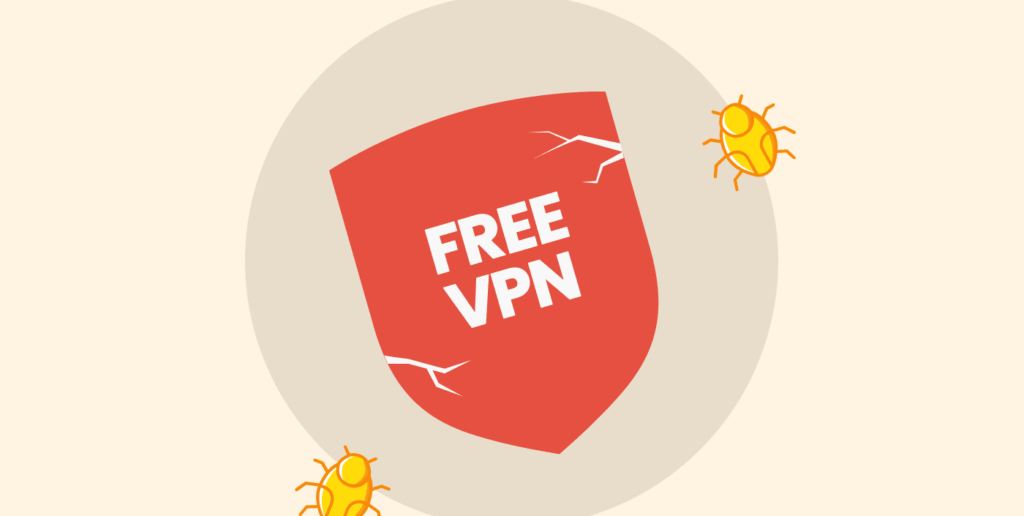
While the idea of using a free VPN is appealing, it is a risky bet that usually has too many problems to overcome compared to a premium option. While a few reputable services offer free plans (for example Proton VPN), the vast majority of unregulated free VPNs can result in compromised privacy and security, defeating the whole purpose of using a VPN.
The threats of free VPNs
- Data harvest and sell: Most free VPNs log and sell your data that includes your browsing history, location, and even device information, to third-party advertisers.
- Weak security: Many free services actually use outdated encryption or weak encryption protocols allowing third party hackers access to your online activities, especially while using public Wi-Fi.
- Malware and adware: They may have hidden malware or adware and can infect your device, steal your information, and show intrusive ads and/or pop-up ads.
- Poor performance: Free services often consist a very slim amount of servers, which are full to the brim, that leads to poor speed, constant disconnects and unreliable access. You’ll be disappointed if you even have to load a simple Wikipedia page.
- Limited research: Ultimately, they’re generally ineffective in bypassing tough censorship and geo-restrictions. Consequently, it won’t be able to unblock Wikipedia in a restricted country.
If you want a reliable freemium option, we recommend Proton VPN (for basic use).
How to use a VPN to unblock Wikipedia
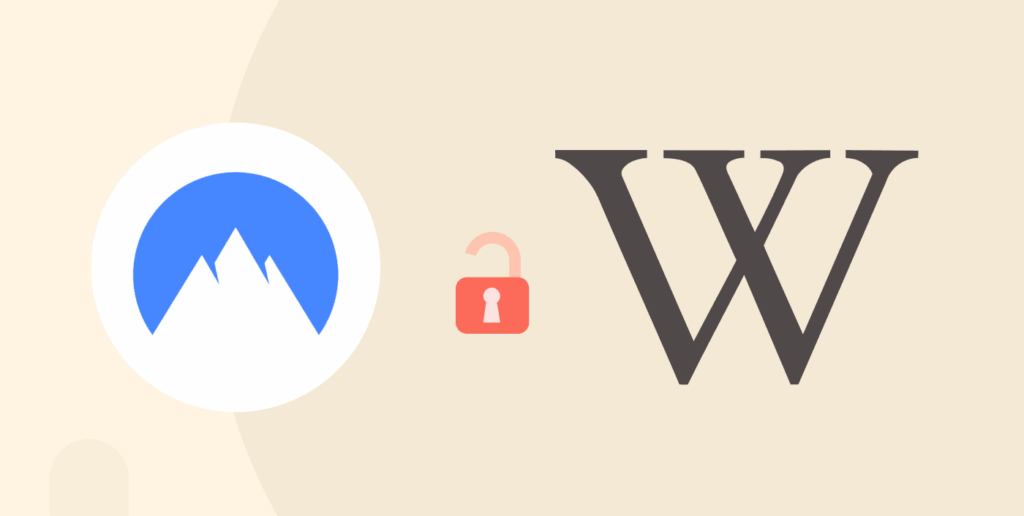
Using a VPN isn’t a hussle task; you just have to follow simple steps below:
- Choose and subscribe to a reputable VPN service. We highly recommend NordVPN due to its reliability, speed, and security features.
- Download and install the VPN application on your device (premium VPNs offer dedicated apps for all major operating systems).
- Log in with your credentials.
- Connect to a server where Wikipedia is completely accessible. For instance, the US and Europe don’t have any restrictions on accessing Wikipedia, so choose one from these regions.
- Start browsing.
Is it legal to use a VPN with Wikipedia?
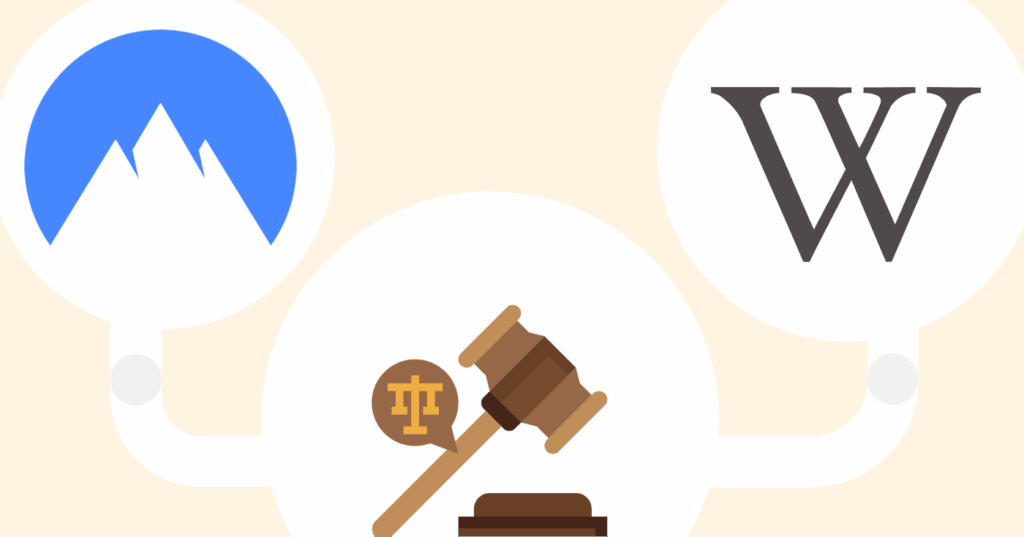
As long as you’re using a VPN for legitimate reasons, VPN is completely legal and safe (even accessing Wikipedia from a restricted region). Wikipedia does not stipulate against the use of VPNs to read its content.
In fact, given the nature of censorship, Wikipedia’s administrators have procedures to allow editors to use VPNs (with a special IP block exemption) for access and to continue their work in a very modified capacity especially when working from heavily censored areas.
Regardless, the general rule of thumb is that using a VPN, when involved in any criminal activities will be illegal even if the VPN was used. You should always be aware of the rules and regulations in your own country.
Where is Wikipedia blocked?
Wikipedia has faced and faces censorship in a number of countries around the world, either partially or fully. These countries include:
| China | Iran |
| Pakistan | Russia |
| Turkey | Venezuela |
| Saudi Arabia | Syria |
| Myanmar |
For many of these jurisdictions, VPN has to be the only way of getting access to the full Wikipedia content.
Will Wikipedia have to verify readers’ ages in the UK?

This matter results from new legislation from the UK, and could greatly change how readers and editors use Wikipedia. Wikipedia does not verify UK readers’ age as of now, but the future on this is uncertain and the impact on access to information is substantial.
What does the Online Safety Act require?
The new Online Safety Act (OSA), which was enacted in October 2023, regulates all user-generated platforms (the likes of Wikipedia, Reddit, Medium, etc). The main aim of the legislation is to better protect children on the internet from harm. Online platforms must have “highly effective” age verification processes in place to restrict children under the age of 18 from accessing what the OSA describes as “primary priority content.” OSA also regulates platforms to take down illegal content in a timely manner.
This is not just adult content, but any content connected to self-harm and eating disorders. The government has indicated that “self-declaration,” such as typing a birth date, will not satisfy their compliance.
The possible effects on Wikipedia
Though the main focus of the Act was the regulation of for-profit social media companies such as Facebook and TikTok, this has forced the Wikimedia Foundation to consider the repercussions. The Foundation has asserted publicly that Wikipedia is not a for-profit organization, and as a user-generated encyclopedia, should not be subject to similarly strict rules.
They claim the use of age verification would infringe upon privacy, that it would disproportionately harm editors living in censored countries, and undermine the key commitment to openness and anonymity that Wikipedia is contingent upon.
In August 2025, the Wikimedia Foundation lost a legal argument in the UK’s High Court over the regulations, which stated the law “should not significantly impede Wiki’s operations.” The court was confident that the site could be classified in such a way that would require age verification for certain content.
The final determinations will lie with Ofcom, the UK regulator for online safety. While it remains unknown what the outcomes will be, it represents a threat to the global model of Wikipedia and possibly other means of open content sharing.
FAQs
The most common problems you can encounter are that you cannot connect to the server, or the VPN service you are using cannot unblock the Wikipedia site. This would normally be a result of either you not using the most recent version of the VPN app or the country you live in has blocked that VPN server. The best solution is to switch servers or let the customer service representative from your VPN assist you.
It is possible. Most likely, using a VPN will cause your connection speed to decrease slightly because a VPN adds some encryption to your internet connection. With a premium VPN like NordVPN, the potential speed loss will be so slight that you will hardly notice the change when using Wikipedia.
Using a VPN to access Wikipedia is not illegal (in most places) even if you are using a VPN in a country where VPN use is illegal, unless the country expressly prohibits the use of VPNs. Even then, you should be careful.
Best VPN to go with for Wikipedia would be one with a huge server network, a no-logs policy, and some hardcore security features like a kill switch. You will want to ensure that your VPN of choice can also unblock geo-restrictions.
